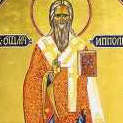Pope Leo XIV – Inaugural Mass Homily
Elected on May 8, 2025, as the 267th successor of St. Peter, Pope Leo XIV’...

Saint Hippolytus was a priest in the Church of Rome in the late second and early third centuries and an important early Church Father. Known for his extensive and profound teaching, he is undoubtedly the most important Roman theologian of the third century, in a time when the liturgy and all teaching of the Church in Rome was done in Greek. When Callistus, whom he considered to be a liberal, was elected to the Papacy, St. Hippolytus contested the election, apparently setting himself up as an anti-pope. His separation from full communion with the Church lasted for several years. Yet ultimately he and Pope Callistus’ lawful successor, Pontianus, found themselves suffering side by side during a wave of persecution. They reconciled and died together for their faith in the mines of Sardinia in 235 AD. St. Hippolytus’ great work The Apostolic Tradition was only rediscovered in the 20th century, providing an enlightening and extensive glimpse into the liturgical and devotional life of Roman Christians around the year 200 AD. For more on Hippolytus, see chapter 14 of Marcellino D'Ambrosio, When the Church was Young, Voices of the Early Fathers (Servant, 2014). Biography by Dr. Italy